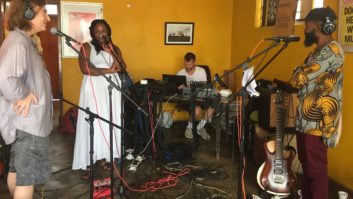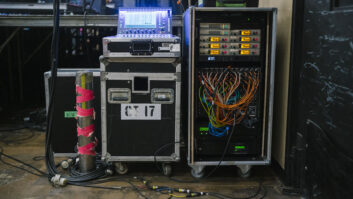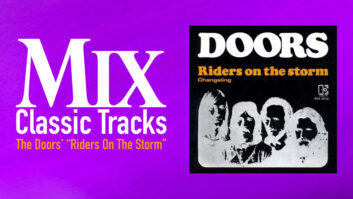Los Angeles, CA—Benin-born singer-songwriter Angélique Kidjo has re-created Remain in Light, Talking Heads’ landmark Fela Kuti-inspired album from 1980, bringing in musicians such as drummer Tony Allen, one of the godfathers of Afrobeat, and members of Brooklyn’s Antibalas, itself modeled after Kuti’s Africa ’70s band. The cultural references are head-spinning. Helping make sense of everything was Jeff Bhasker, a Grammy Award-winner for his work with Mark Ronson, Kanye West, Fun and Jay-Z, and 2016’s Producer of the Year.
Bringing in authentic voices was all part of taking Talking Heads’ influences, “inverting them, and showing how that album influenced Angélique, and taking it back to the roots. It was one of the only ways to compete with the original,” says Bhasker, whose production and writing credits also include Bruno Mars, Drake, Rihanna, Ed Sheeran and many others. The album is Kidjo’s first English-language release.

Talking Heads have cited Nigerian musician and activist Fela Kuti as one of the principal influences on the album’s cross-genre, polyrhythmic grooves—an unfinished outtake on the album’s 2006 remastered reissue is even entitled “Fela’s Riff”—so Allen’s contributions helped bring things full circle, comments Bhasker. “It was helpful to have the actual person who influenced them on our album. To have one of the innovators of Afrobeat music on the album was a total blessing.”
Kidjo worked up the new arrangements with her husband, musician/engineer Jean Hebrail, at their homes in Brooklyn and Paris. They and the musicians, including guitarists Lionel Loueke and Dominic James, percussionist Magatte Sow and bass player Rody Cereyon, traveled to Bhasker’s home-based L.A. facility, Green Oak, where multiple rooms are wired for tracking. Blood Orange and Ezra Koenig of Vampire Weekend are also featured on the album.
Allen, in his late 70s, recorded his contributions in France, where he lives. “I didn’t want him to have to travel to L.A. just to do a couple of tracks,” Bhasker explains. “His drum tracks were recorded amazingly. It was almost like a change in the electricity; you can hear it on ‘Houses in Motion’—it really puts his drums front and center.”
Related: Angelique Kidjo’s “Remain in Light,” by Barbara Schultz, May 14, 2018
Green Oak is equipped with Avid Pro Tools 12 and a Trident B Range console typically manned by Ryan Nasci, Bhasker’s in-house engineer since 2017’s Harry Styles project. Working with Ronson on his Uptown Special project “gave me the jones to work on consoles,” says Bhasker, who believes that the desk, which once resided in Greece, may also have been used at London’s Sarm Studios.

Bhasker previously had an in-the-box writing studio. At Green Oak, “The console is mainly used for front-end to go into the box; I rarely mix on it. But I did a project where we did the reverse—we had someone’s tracks done in Cubase and mixed them on the console. I’m just trying to experiment with different ways of working. Each project warrants a different thing,” he says.
He’s looking forward to doing a project with his recent acquisition, an 8-track Scully tape machine: “I’d like to do a project exclusively using the console and tape. I’m not some sort of purist; it’s fun to see how the process alters the sound of the music.”
Kidjo’s album was the first project to benefit from his facility’s natural room reverb, he reports. “It was really cool to use the space in that way. And it was great to go from Harry Styles’ rock ’n’ roll band-type production into this. It was a continuation of using live instruments and making an album in more of a traditional way than the way albums are typically made today,” he adds.
Many of the tracks feature African chants, and where David Byrne originally spoke his lyrics—“And you may find yourself, living in a shotgun shack”—Kidjo instead sings them. “She really homed in on the opportunities to make it her own. She so elegantly set the tone for the project and Africanized the album from the get-go,” says Bhasker.

It’s not unusual for African percussion instruments to include bits of metal and other materials that generate overtones and resonances. Recording instruments such as the djembe, calabash and balafon, he says, “is not just about learning microphone technique, but learning about the instrument itself and what it’s meant to sound like. It was so interesting, almost like a buzzing thing, almost this distortion that’s built into the drums.”
Green Oak offers a good complement of mics, including Neumann U 87 and U 67 models, a Sony C-800 and Shure 57s and 58s, which work fine on African percussion. Bhasker singles out his AEA R88 ribbon mic for particular praise: “It’s a great microphone; it sounds sick.”
The outboard gear selection is equally classic, including a pair of 1176s, some dbx 160s, Tube-Techs and LA-2As—“About 10 channels, enough to accommodate tracking a drum kit properly,” he says.
The finished tracks went to Michael Brauer for mixing. “Angélique had worked with him before, and I think it was a really good call,” says Bhasker. “He brought a nice understanding of her sound to it. I love the way his mixes added an extra stage to the album. I couldn’t be happier with how it turned out.”
Related: National Recording Registry Adds 25, by Steve Harvey, April 5, 2017
Remain in Light, released during the Reagan presidency, offers commentary that resonates in today’s “fake news” era—“Facts are never what they seem to be,” from “Crosseyed and Painless”—but if anything, this project bridges political divides, says Bhasker.

“It’s part of a larger metaphor for listening to each other and taking the best of each other’s cultures and receiving it, at a time when we’re so polarized politically, and everyone is in their bubble. I really love the idea of it being this mixture and being part of this conversation and tradition of comingling.”
Want more stories like this? Subscribe to our newsletter and get it delivered right to your inbox.
As new releases were being proposed for Grammy Award consideration in November, Bhasker learned that the project, released on his Kravenworks label, had been moved from the World Music to the Alternative category. “I’m happy because it really puts her at a new level. Even though it’s a world music adaptation, I feel very honored that they consider us as being a more contemporary category. But it’s so ironic—‘world’ should mean the whole world!”
Jeff Bhasker, www.jeffbhasker.com







